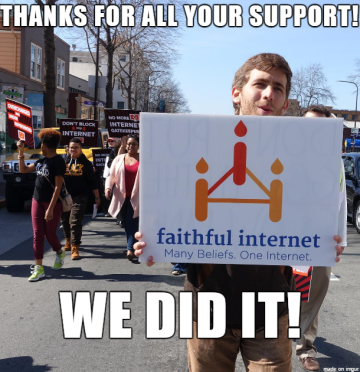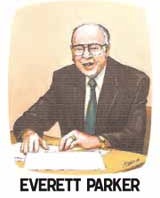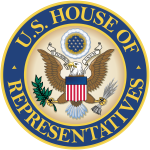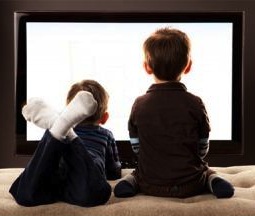Blog
Spring 2015 Newsletter
Celebrating a Victory, With an Eye to the Future
On February 26th, the Federal Communications Commission (FCC) voted to reclassify the Internet as a public utility, as essential as water and electricity, and adopted strong protections to keep the Internet open and free for this and future generations.
 One year ago, today’s victory today was unimaginable. We were up against powerful forces that wanted the power to block and slow down sites and create fast lanes for those who could pay—and slow lanes for the rest of us. It didn’t seem like everyday Americans had a chance. But millions of us stood up and spoke out: entrepreneurs, educators, artists, activists, and people of many faiths and moral backgrounds.
One year ago, today’s victory today was unimaginable. We were up against powerful forces that wanted the power to block and slow down sites and create fast lanes for those who could pay—and slow lanes for the rest of us. It didn’t seem like everyday Americans had a chance. But millions of us stood up and spoke out: entrepreneurs, educators, artists, activists, and people of many faiths and moral backgrounds.
Against all odds, millions of Americans of all faiths and backgrounds fought for our future—a future that preserves the Internet as a space where all our voices can be heard, regardless of income, race, religion, or status. We are so proud of the UCC JPANet members and other faith leaders like Rev. J. Bennett Guess, Rev. Jennifer Bailey, Rev. Dr. William J Barber II, who raised their voices to help achieve this victory.
Some members of Congress are working to undo the FCC’s decision. Please stay tuned and check out faithfulinternet.org for more information on this developing story.
Save the Date, Parker Lecture 2015
 The date for OC Inc.’s 33rd annual Everett C. Parker Lecture has been set for October 20th 2015. Join us to celebrate all of the hard work being done at the intersection of social justice and telecommunications. More details coming soon. we are currently taking nominations for the Parker Award and our other awards, please nominate candidates.
The date for OC Inc.’s 33rd annual Everett C. Parker Lecture has been set for October 20th 2015. Join us to celebrate all of the hard work being done at the intersection of social justice and telecommunications. More details coming soon. we are currently taking nominations for the Parker Award and our other awards, please nominate candidates.
![]()
Finish Prison Phone Rate Reform
 UCC OC Inc., NAACP, Center for Media Justice and others teamed up with religious organizations, civil rights groups, labor and many others to submit a letter in January supporting further reforms to end predatory prison phone rates. The letter praised the FCC’s reform last year ending predatory long distance rates and encouraged it to quickly cap local phone rates and block unfair fees. We also urged the FCC to take rapid action to protect people with disabilities, and to investigate unscrupulous rates for email and video visitation. Learn more about prison phone rates on our prison phone campaign web page.
UCC OC Inc., NAACP, Center for Media Justice and others teamed up with religious organizations, civil rights groups, labor and many others to submit a letter in January supporting further reforms to end predatory prison phone rates. The letter praised the FCC’s reform last year ending predatory long distance rates and encouraged it to quickly cap local phone rates and block unfair fees. We also urged the FCC to take rapid action to protect people with disabilities, and to investigate unscrupulous rates for email and video visitation. Learn more about prison phone rates on our prison phone campaign web page.
Letter to the House Oversight Committee
 On March 18th, OC Inc. delivered a letter, signed by over 30 other social justice organizations, to the Congressional House Oversight Committee. In our letter we expressed to Congress our support for the FCC’s approval of strong open internet rules, and our disappointment that Congress is looking to overturn these consumer protections.
On March 18th, OC Inc. delivered a letter, signed by over 30 other social justice organizations, to the Congressional House Oversight Committee. In our letter we expressed to Congress our support for the FCC’s approval of strong open internet rules, and our disappointment that Congress is looking to overturn these consumer protections.
Disappointing Ruling on Kids TV
 Working on social justice always involves steps forward and steps back. Even as we celebrated a net neutrality victory, the FCC rejected two 10-year old petitions by the United Church of Christ’s media justice ministry. These complaints were part of a series of complaints filed in 2004 and 2005 that highlighted the most egregious violations of the Children’s Television Act. In 2007, one of these petitions was responsible for the biggest fine in FCC history at the time, a $24 million forfeiture by Univision. The FCC’s rejection of these petitions, in a two and a half page letter was a rejection of the needs of the tens of millions of families who don’t have access to broadband at home and thus rely on broadcasting for educational television. As we said in our statement, “the FCC’s action told these children that no one is willing to look out for them.”
Working on social justice always involves steps forward and steps back. Even as we celebrated a net neutrality victory, the FCC rejected two 10-year old petitions by the United Church of Christ’s media justice ministry. These complaints were part of a series of complaints filed in 2004 and 2005 that highlighted the most egregious violations of the Children’s Television Act. In 2007, one of these petitions was responsible for the biggest fine in FCC history at the time, a $24 million forfeiture by Univision. The FCC’s rejection of these petitions, in a two and a half page letter was a rejection of the needs of the tens of millions of families who don’t have access to broadband at home and thus rely on broadcasting for educational television. As we said in our statement, “the FCC’s action told these children that no one is willing to look out for them.”
Civil Rights, Media Justice, and Labor Groups Applaud the FCC for Further Action on Unfair Prison Phone Rates
Contact Info: Stephanie Vanegas, 415-495-4200 ext.101 | stephanie@spitfirestrategies.com
Washington D.C. – In response to the Federal Communications Commission (FCC) voting to approve a Second Further Notice of Proposed Rulemaking, to comprehensively reform interstate and intrastate inmate calling services for prisons and detention facilities, civil rights, media justice, and labor groups released the following statement:
“The FCC’s plan to address the cost of local telephone calls to prison, jails and immigration detention facilities is another step toward reducing the unfair financial burden on incarcerated people and their families. We applaud Chairman Wheeler and Commissioner Clyburn’s leadership to ensure that inmates can maintain contact withparents and grandparents, children, spouses, siblings, clergy and friends.
Preserving the most reliable way for inmates to keep relationships that matter is one of the best ways to ensure our communities are safer and to decrease re-offenses and reentry into the criminal justice system.
Read more…
2014 Parker Lecture Press Release
FCC Chairman Wheeler Highlights Need for Greater Broadband Access nd Diversity in Media Ownership
Federal Communications Commission Chairman Tom Wheeler Tuesday pledged to improve the rates of media ownership by women and persons of color during his tenure as chairman, and said he was treating the commission’s open Internet rules as “the most important decision of my term.”
Wheeler’s remarks came as he delivered the 32nd Annual Everett C. Parker Ethics in Telecommunications Lecture at the Newseum in Washington.
The event, sponsored by the United Church of Christ’s Office of Communication, Inc., was held in partnership with the Newseum Institute this year to mark the 50th anniversary of Rev. Dr. Parker’s ground-breaking petition to the FCC. The petition, filed at the height of the civil rights movement, challenged the television license of WLBT in Jackson, Mississippi, for its failure to cover its African-American viewers. The petition ultimately led the FCC to strip the station owners of their license, and established the right of individual citizens to petition the agency.
“Everett Parker fought for the free flow of information without economic obstruction,” Wheeler said. “.…The history of America is the history of unpopular ideas that came to be recognized as essential truths – from the independence of colonies, to the abolition of slavery, to the simple notion that people should not be judged on the basis of race, ethnicity or sexual orientation. This is why free expression is a value that stands at the center of our work to promote an open Internet.”
The chairman observed that the Internet also represents “an unprecedented expansion of economic opportunity. Networks have always been the backbone of economic expansion, but what is new this time is that an open Internet allows innovative economic activity to reach scope and scale at an unprecedented rate. ”
Read more…
Makani Themba’s 2014 Parker Lecture Remarks
Thank you. first, I want to congratulate Kathy Sandoval, what great company to have on this day. thank you for your amazing work over the years. I want to thank my movement family – especially my comrades at the praxis project who share this award with me. Thank you to my sistar Jaribu Hill for being here, for her incredible work as a hunan rights lawyer and culture warrior
Thank you united church of christ office of communication. what an August and incredible institution. thank you for your pioneering leadership, leadership that has always understood that there can be no justice when people are silenced. thank you.
I am deeply, deeply honored to receive this recognition named for one of my personal heroes, Rev. Rverett C. Parker. and in 2014, the 50th anniversary of the challenge filed against the license of WLBT in Jackson, MS? Just amazing! when Rev. Parker, Aaron Henry and Rev. R.l.T. Smith filed that challenge 50 years ago, you could only get involved in FCC matters if you had what they thought was an economic stake or the broadcaster signals created interference. this petition, the years of organizing at its foundation, and the groundbreaking decision that followed will always be a core inspiration to me.
Mississippi is very much on my mind these days.
There have been many milestone anniversaries commemorated this year – 50th anniversary of freedom summer, the civil rights act, the assassination of Medgar Evers and more. I find myself reflecting on the deep, inextricable link between the fight for just access to media and just content grounded in human rights. as Rev. Parker, Rev. Smith and mr. Henry knew back then, racist coverage along with censorship was analogous to shouting fire in a crowded theater. the exclusion of black voices and the promotion of hate had helped to create an environment where black life was cheap.
Read more…
Remarks of Tom Wheeler
32nd Annual Everett C. Parker Ethics in Telecommunications Lecture October 7, 2014
Thank you Pastor Edmonds for that introduction. Congratulations to Makani Themba and Commissioner Cathy Sandoval for your well-deserved recognition.
It is an honor to follow Reverend Truman Parker – following a Parker is natural for all of us, and that, in part, is what I’d like to address today.
There are multiple reasons why it is a privilege to be here, but I want to highlight two.
First, I grew up in a UCC church. The church is one that in its own words “joins faith with action.” This call to action challenges us to search for social justice. Everett Parker took that challenge to the parochial corners of telecommunications policy.
Secondly, I knew Everett Parker. Not well, but in the late 1970s we both advocated for diversity of voices in media. I was doing it for the cable television industry, which had an obvious interest in overcoming the restrictive rules imposed by the FCC. Rev. Parker did it because diversity of choice and diversity of opportunity was what he was all about.
Today we celebrate Rev. Everett Parker’s service to God and his contribution to our society. When he appealed the FCC’s 1965 decision to grant WLBT’s license renewal in United Church of Christ v. FCC, he not only took on racism, but also he established the landmark precedent that gave ordinary citizens the right, for the first time, to participate in FCC proceedings.
The fact that today all FCC processes are open and that anyone can provide comments on the topics we discuss is a tremendous legacy that we too often take for granted.
Before this decision, the FCC’s position was that only those alleging “economic injury and electrical interference” had the right to challenge its licensing decisions
But Chief Judge, and soon-to-be Chief Justice, Warren Burger wrote a powerful opinion that said that the public played an important role as “private attorneys general” in helping the FCC enforce the public interest standard.
I have often said that the networks that connect us are the forces that define us – not just our commerce, but also our culture and individual lives. Everett Parker gave us all a voice in the policy related to that defining force.
Read more…
